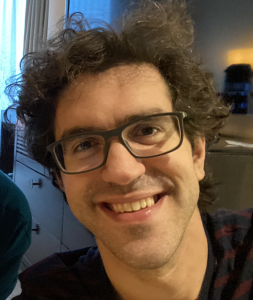In this interview as part of the Early Career Innovators series, recognising the amazing translational work being done by postdocs and non-tenured researchers at University College London (UCL), Dr Apostolos Papandreou highlights his Small Molecules Therapeutic Innovation Network (TIN) Pilot Data Fund awarded project, involving novel drug development for a genetic neurodegenerative disorder.
What is the title of your project and what does it involve?
The title of my project is ‘Development of novel autophagy inducers for the treatment of Beta-Propeller Protein-Associated Neurodegeneration (BPAN)’. It involves developing new drugs for a rare, devastating, life-limiting neurodegenerative disorder: Beta-Propeller Protein-Associated Neurodegeneration (BPAN).
In my previous work, I performed a drug screen and identified promising drugs that ‘treat’ BPAN nerve cells in the laboratory. Namely, I developed a brain model of BPAN; I converted patients’ skin cells into ‘stem cells’, which have the capacity to transform into any cell type in the body. I then manipulated these stem cells to create a specific type of brain cell (known as “dopaminergic neurons”) that are significantly affected in BPAN. I utilised this laboratory model (our “disease-in-a-dish”) to understand disease processes and confirmed that a crucial waste disposal and recycling system (termed ‘autophagy’) is defective.
I tested thousands of drugs for their capacity to treat BPAN in the dish – using both approved drugs, and others still under development. I successfully identified several promising drugs that restore autophagy in BPAN. I now want to test derivatives of the most promising of these drugs further, to identify ones with improved qualities, that can in turn be taken forward to future studies on other preclinical models and, ultimately, to a clinical trial.
What is the motivation behind your project/therapeutic?
BPAN is a recently identified genetic condition, emerging as the commonest form of a group of disorders known as childhood-onset Neurodegeneration with Brain Iron Accumulation (NBIA). Affected children initially present with delayed development, seizures and behavioural difficulties. A second devastating illness phase manifests in teenage years or early adulthood, with an irreversible decline in abilities (loss of independent walking and talking) and dementia. There is an urgent translational need to better understand BPAN and develop effective treatments for it.
At Great Ormond Street Hospital, we have established a nationally-recognised clinical service for children with BPAN, as well as a programme of important laboratory research at UCL. Since 2016, we have been working towards better understanding the processes causing BPAN in order to develop effective therapies.
I now plan to further develop novel drugs that have the capacity to ‘treat BPAN in the dish’, with the ultimate goal to translate these novel therapies into the clinic for my BPAN patients.
Why did you want to apply to the Small Molecules TIN Pilot Data Scheme?
The Small Molecules TIN is an excellent platform of drug development therapeutic innovation, into which my project and research fits really well. I am an early career researcher, and the fund was addressed to people at this career stage. Moreover, I have been working within UCL over the last few years in order to develop small molecule therapies for BPAN. UCL collaborators (from the TRO Drug Discovery Group) have now created derivatives of the most promising small molecules I identified in my previous work. My plans to further test, validate and develop these molecules not only build on my previous work and hold potential for translational therapeutic benefit, but promote intra-UCL collaborations between institutes, departments, and groups. For all these reasons, I feel that the Small Molecules TIN Pilot Data Scheme will be a very suitable springboard for future therapeutic development for BPAN, and also for my development as an academic clinician with a translational focus.
How did you find the process for the TIN Pilot Data Fund? What did you learn?
This process has been a very enjoyable and educational experience. The application was well advertised and straightforward, and the form easy to fill in and to the point. Importantly, as part of the application process and interview preparation, I had the chance to attend the associated ACCELERATE training workshop. This interactive workshop taught me to better pitch my research ideas in a way that my audience can understand; it was also very useful in improving my PowerPoint presentation skills. Hints and tips were given throughout, and it was nice to work interactively with other people in similar career stages within UCL. Overall, I think the whole process is an excellent opportunity for early career researchers looking for translational funding opportunities.
What do you hope to achieve in the 6 months duration of your project?
I hope to test the new drug derivatives, and identify ones that work well in ‘treating BPAN’ in the dish but are also effective in much smaller concentrations. These can then be tested in other models, as appropriate, prior to clinical trials. I also hope to better elucidate the mechanism of action of these compounds, which would be interesting in its own, but would also shed light into the pathophysiological mechanisms leading to disease in BPAN.
What are your next steps from now?
After the TIN project, promising candidate molecules will be tested in BPAN 3-D ‘mini-brains’ that I am concurrently developing in the lab, and/ or a mouse model of BPAN that I am also aiming to establish with help of international and intra-UCL collaborators. Discussions with MHRA will guide my steps to progression towards the clinic. My ultimate goal is to develop disease modifying/curative treatments for BPAN. I also aim to become an independent clinician scientist, with a particular interest in paediatric neurometabolic disorders and a bench-to-beside approach to developing novel therapeutics for my patients.
About Apostolos Papandreou 
Dr Apostolos Papandreou was born in Greece in 1981. He studied medicine there, and subsequently moved to the UK in 2007. He had all his postgraduate paediatric training and then underwent paediatric neurology subspecialty training at Great Ormond Street Hospital, London (2013-2021). His PhD studies were on novel therapeutic development for rare disorders (PhD, University College London 2020).
He is now an NIHR BRC Catalyst fellow at UCL (Great Ormond Street Institute of Child Health), continuing his research in neurometabolic and neurodegenerative conditions with a focus on developing new, disease-specific treatments; he is also an honorary Paediatric Neurology Consultant at the Evelina London Children’s Hospital (Complex Motor Disorders Service).
 Close
Close




